The Devon Rex breed is unique in both appearance and personality. These wavy-coated cuties exist in homes throughout the world. Owners adore them and say they’re truly a wonderful addition to any family. Today, we’ll take a look at Devon Rex prices along with what factors influence the cost. Before that, let’s learn a bit about this fun, elf-like cat breed!
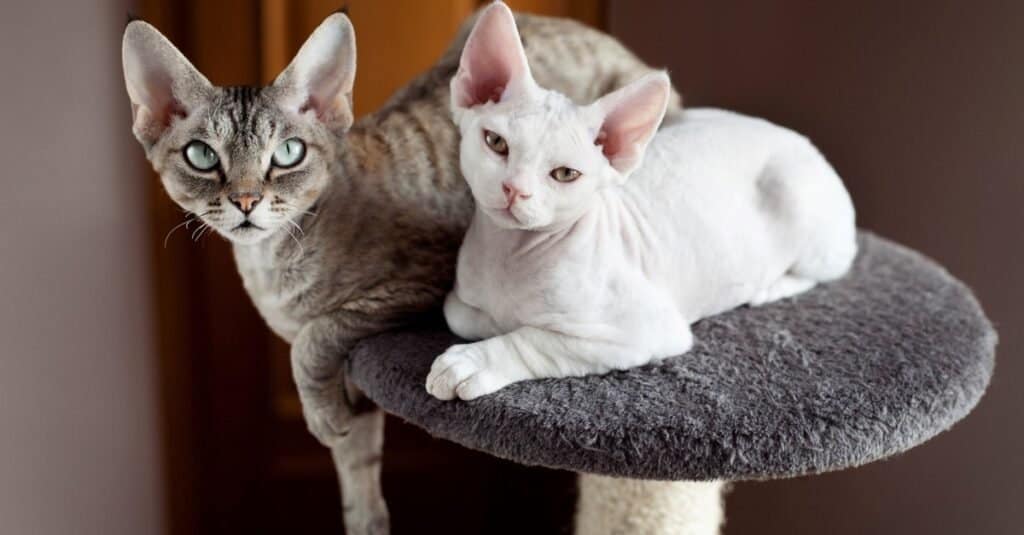
Devon Rex cats are active and mischievous pets that truly enjoy spending time with their human friends.
©Veera/Shutterstock.com
A Brief History of the Devon Rex
The Devon Rex has its humble beginnings in 1960 in Devon, England. Miss Beryl Cox’s female cat was bred by a feral male with a unique wavy coat. When the kittens were born, Miss Cox discovered that one of them also had a curly coat like his father. She named the kitten Kirlee and began to research other breeds with this interesting fur growth. The coat was similar to that of the Cornish Rex but differed in that the gene produced tight curls and stubby whiskers. The Cornish Rex gene produced curled and bent whiskers with a more uniform wave across the coat.
Eventually, geneticists determined two different genes were at play between the two Rex cats, thus the two continued developing as separate breeds. The Devon Rex was accepted in the show ring by The International Cat Association in 1979 and The Cat Fancier’s Association in 1983.
Devon Rex Description
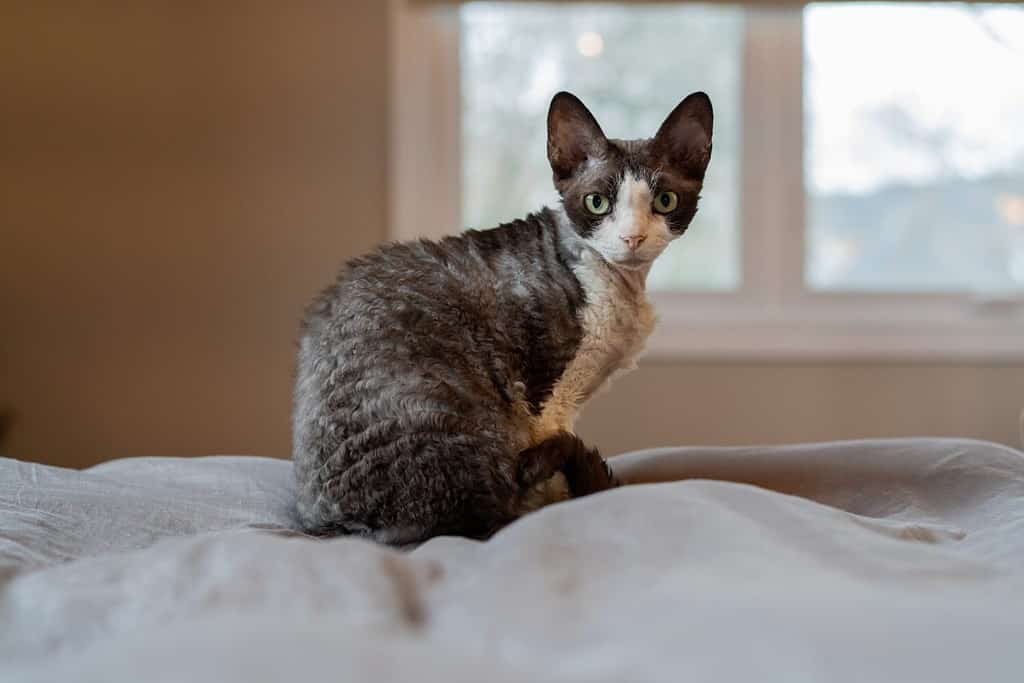
Large ears and a curly coat define the Devon Rex.
©Heather Raithby Doyle/Shutterstock.com
The Devon Rex is widely known for its Elvin features, such as their large, wide-set ears with light furnishings at the tip. The fur tipping the ears helps to give them a pointed appearance, despite the ears truly being rounded at the ends. The face of the Devon Rex sets it apart from other breeds because it is marked by prominent bone structure to compliment the massive ears. The defining factor is, of course, the wavy coat. According to show standards, the coat must lie close to the skin and feel silky to the touch.
The personality of the Devon Rex is lively and playful. These cats enjoy snuggling with their owners. Some may even crawl under the blanket in bed. They like to explore, climb, and be involved with all the activities in the home. Devon Rex owners love that these cats retain their kitten-like personalities well into their elder years. Their inquisitive and gentle nature makes them great for families with children.
With our new knowledge about Devon Rex cats in hand, let’s explore prices.
How Much Does a Devon Rex Kitten Cost?
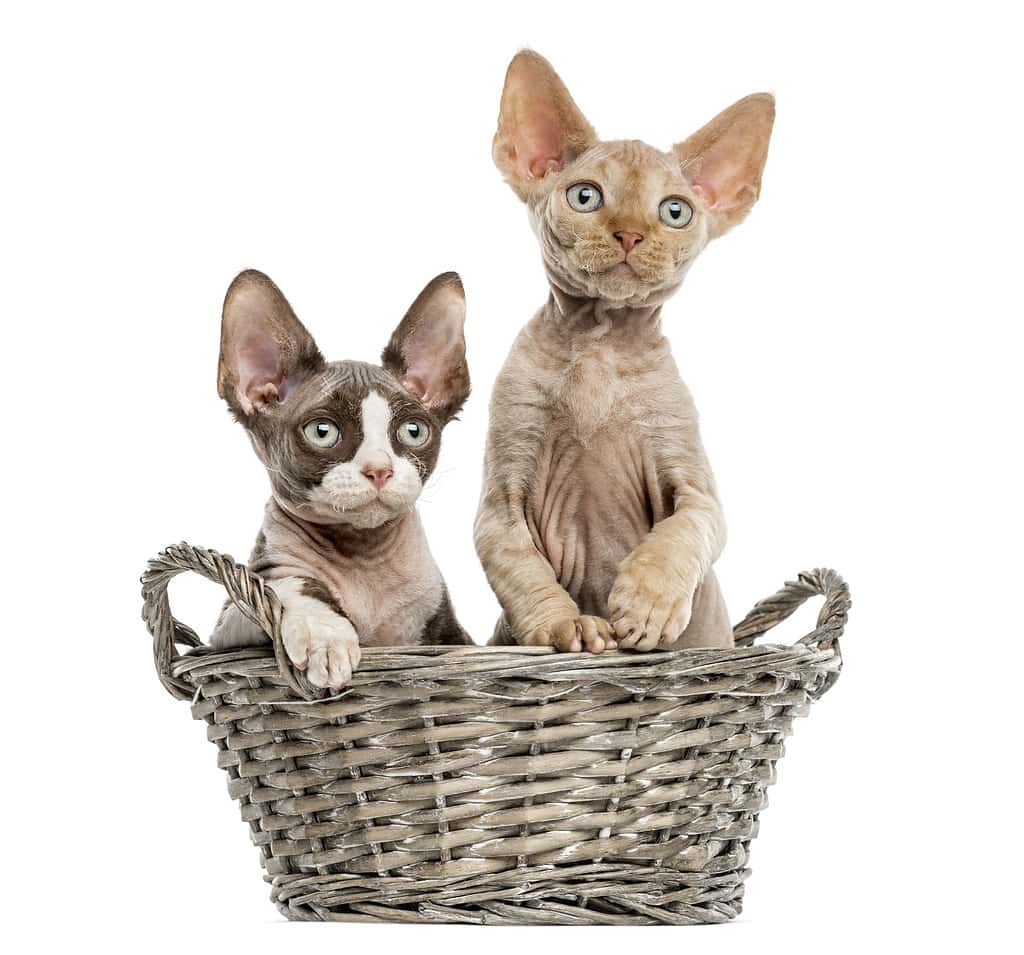
Devon Rex kittens retain their kitten-like energy until old age.
©GlobalP/iStock via Getty Images
Devon Rex prices range from $1,800 to $3,000 on average. Sometimes, breeders offer retired breeding cats at a lower cost, as well. You may find a cheaper price on a Devon Rex, but the old saying “you get what you pay for” applies to purchasing a cat, as well. Kitten mills often produce poor-quality kittens to make a quick bit of money. However, these cats are frequently riddled with health problems. Your best option is to find a reputable breeder who knows the breed well and takes the time to explain to you why their cats are the best!
Other Factors That Influence the Purchase Price of a Devon Rex
Thankfully, since the Devon Rex comes in a huge variety of colors and patterns, you’re unlikely to find that a certain color costs more. However, when it comes to quality, you may see increased prices. This is especially true when you choose a Devon Rex from a top bloodline, which can cost an additional $1000 or more. Breeders who have cats that win show titles typically charge more for their Devon Rex cats.
Cost of Vaccination and Other Medical Expenses for a Devon Rex
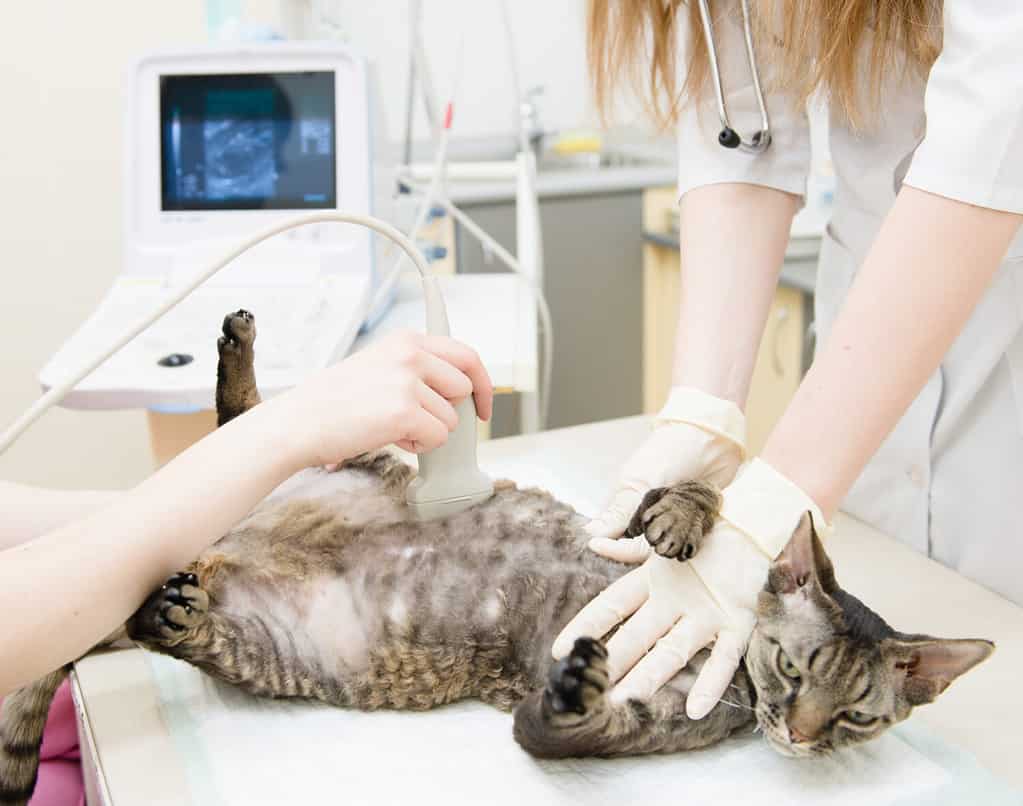
Devon Rex cats are prone to heart disease, which requires an ultrasound to diagnose.
©Ermolaev Alexander/Shutterstock.com
Veterinary care is essential to the health and well-being of your Devon Rex. From basic vaccines and heartworm/flea/tick prevention to common hereditary diseases (passed from parent to kitten), the cost of veterinary care could dramatically increase for your Devon Rex throughout their life. Let’s learn about the cost of routine care and disease treatment below.
Hypertrophic Cardiomyopathy
Hypertrophic cardiomyopathy (HCM) is a deadly disease found in several cat breeds. Devon Rex cats sit near the top of the list. Diagnosis for HCM involves a cardiac ultrasound, which can cost anywhere from $300 to $1000 per cat. The worst part is that screening is required every six months to one year since there is no other test available at this time. This dramatically increases the cost of owning a Devon Rex. Reputable breeders have all their breeding cats scanned at least yearly to help detect problems as soon as possible. Until a cat is still scanning clear at eight years old, they cannot be considered free of HCM.
Similar to Bengal and Sphynx cats, this disease is thought to be inherited from the parents. There is no cure for HCM. Treatment for your Devon Rex that develops complications from HCM is likely to require hospitalization, which costs thousands. Unfortunately, a large percentage of cats with HCM die before their first birthday.
Vaccines
Vaccines for kittens start at 8 weeks old. They need repeated vaccinations every 3-4 weeks until they reach 15-18 weeks old. That’s because the antibodies from their mother’s milk die off a some point during this time, but no one has any way to tell when. The goal of this vaccination schedule is to hopefully catch the immune system at the right time so that the cat develops their own antibodies. Vaccines for the first year of your Devon Rex cat’s life cost anywhere from $200 to $1000, depending on where you live. That cost includes examinations by the veterinarian.
Other Preventative Care
Heartworm, flea, and tick prevention should be applied to all cats, even those living indoors exclusively. These parasites can enter your home easily and attack your Devon Rex. There is no cure for heartworm in cats. Fleas and ticks can present other problems and introduce disease to your cat, as well. Prevention costs about $30 a month for Revolution Plus, which covers all three.
Cost of Food and Supplies for a Devon Rex
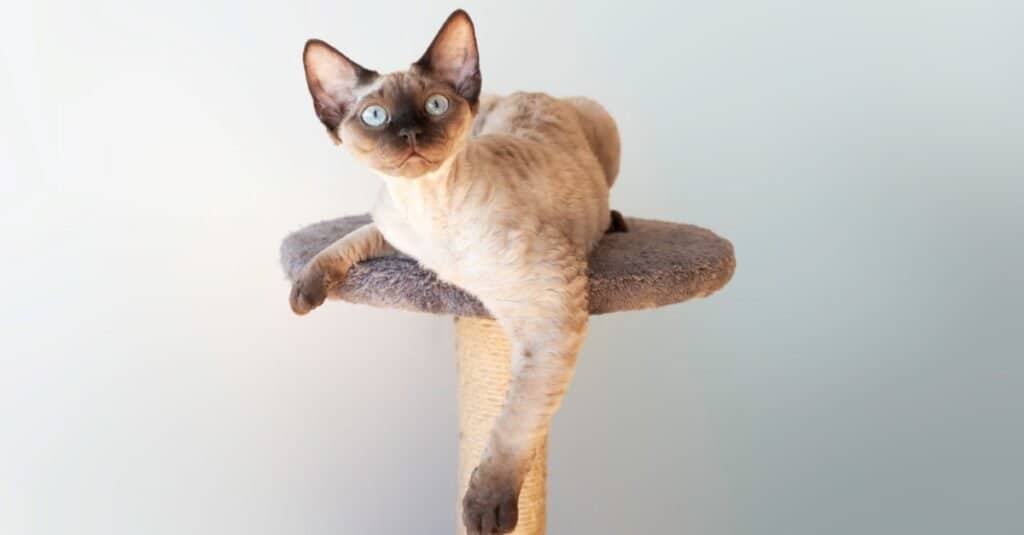
Thankfully, Devon Rex cats don’t require much in the way of special food or supplies.
©Veera/Shutterstock.com
The Devon Rex doesn’t require a special diet, which lowers the cost of care, overall. Discuss with your veterinarian to discover the best cat food for your cat. Keep in mind that expensive doesn’t always mean good, either. Good quality cat food usually costs between $10-60 a month for a single cat.
Other supplies you’ll need for your Devon Rex shouldn’t cost you an arm and a leg, either. A simple litter box, litter, bowls, toys, and treats range from about $200 to $300 or so in the beginning. Replacing needed items each month should be relatively cheap, around $20-40.
How Much Does It Cost to Insure a Devon Rex
Pet insurance prices for a Devon Rex vary between $30 and $200 a month, depending on the company you choose. Pawlicy.com is a very useful site that can help you find the coverage you need at a price you can afford. Remember, most pet insurance companies don’t pay upfront — they reimburse you later up to a certain percentage. Research pet insurance carefully before buying!
The photo featured at the top of this post is © GlobalP/iStock via Getty Images
Thank you for reading! Have some feedback for us? Contact the AZ Animals editorial team.







